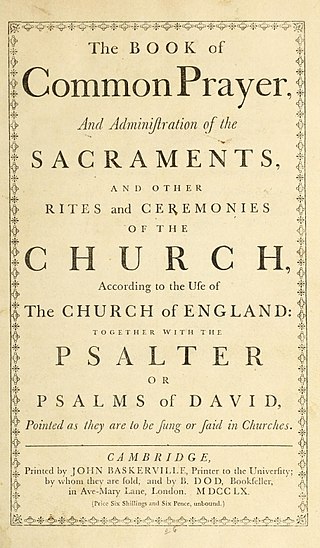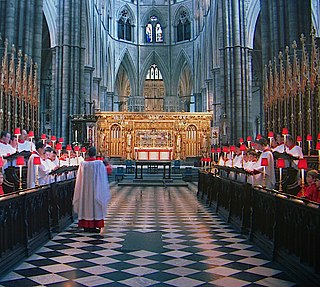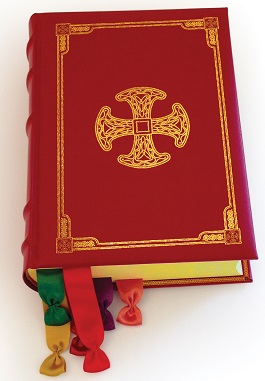History
| | This section needs expansion. You can help by adding to it. (September 2022) |
The calendar of the Anglican Church of Southern Africa was published in 1989 in the book An Anglican Prayer Book 1989. [1]
The Anglican Church of Southern Africa has its own calendar of saints.
| | This section needs expansion. You can help by adding to it. (September 2022) |
The calendar of the Anglican Church of Southern Africa was published in 1989 in the book An Anglican Prayer Book 1989. [1]
| | This section is empty. You can help by adding to it. (September 2022) |

The Book of Common Prayer (BCP) is the name given to a number of related prayer books used in the Anglican Communion and by other Christian churches historically related to Anglicanism. The first prayer book, published in 1549 in the reign of King Edward VI of England, was a product of the English Reformation following the break with Rome. The work of 1549 was the first prayer book to include the complete forms of service for daily and Sunday worship in English. It contained Morning Prayer, Evening Prayer, the Litany, and Holy Communion and also the occasional services in full: the orders for Baptism, Confirmation, Marriage, "prayers to be said with the sick", and a funeral service. It also set out in full the "propers" : the introits, collects, and epistle and gospel readings for the Sunday service of Holy Communion. Old Testament and New Testament readings for daily prayer were specified in tabular format as were the Psalms and canticles, mostly biblical, that were provided to be said or sung between the readings.

The liturgical year, also called the church year, Christian year or kalendar, consists of the cycle of liturgical seasons in Christian churches that determines when feast days, including celebrations of saints, are to be observed, and which portions of Scripture are to be read either in an annual cycle or in a cycle of several years.

In the Western liturgical year, Lady Day is the traditional name in some English-speaking countries of the Feast of the Annunciation, which is celebrated on 25 March, and commemorates the visit of the archangel Gabriel to the Virgin Mary, during which he informed her that she would be the mother of Jesus Christ, the Son of God.

Trinity Sunday is the first Sunday after Pentecost in the Western Christian liturgical calendar, and the Sunday of Pentecost in Eastern Christianity. Trinity Sunday celebrates the Christian doctrine of the Trinity, the three Persons of God: the Father, the Son, and the Holy Spirit.

Sexagesima, or, in full, Sexagesima Sunday, is the name for the second Sunday before Ash Wednesday in the pre-1970 Roman Rite liturgical calendar of the Catholic Church, and also in that of some Protestant denominations, particularly those with Lutheran and Anglican origins. Sexagesima falls within pre-Lent.

A missal is a liturgical book containing instructions and texts necessary for the celebration of Mass throughout the liturgical year. Versions differ across liturgical tradition, period, and purpose, with some missals intended to enable a priest to celebrate Mass publicly and others for private and lay use. The texts of the most common Eucharistic liturgy in the world, the Catholic Church's Mass of Paul VI of the Roman Rite, are contained in the 1970 edition of the Roman Missal.

The Feast of the Transfiguration is celebrated by various Christian communities in honor of the transfiguration of Jesus. The origins of the feast are less than certain and may have derived from the dedication of three basilicas on Mount Tabor. The feast was present in various forms by the 9th century, and in the Western Church was made a universal feast celebrated on 6 August by Pope Callixtus III to commemorate the raising of the siege of Belgrade (1456).
The Anglican Church of Southern Africa, known until 2006 as the Church of the Province of Southern Africa, is the province of the Anglican Communion in the southern part of Africa. The church has twenty-five dioceses, of which twenty-one are located in South Africa, and one each in Eswatini, Lesotho, Namibia and Saint Helena. In South Africa, there are between 3 and 4 million Anglicans out of an estimated population of 45 million.

The Feast of the Circumcision of Christ is a Christian celebration of the circumcision of Jesus in accordance with Jewish tradition, eight days after his birth, the occasion on which the child was formally given his name.

The Anglican Missal is a liturgical book used liturgically by some Anglo-Catholics and other High Church Anglicans as an alternative or supplement to editions of the Book of Common Prayer. The Anglican Missal is distinct from the similarly Anglo-Catholic English Missal, as the Anglican Missal is not primarily a translation of the Roman Missal of the Catholic Church.

Latin liturgical rites, or Western liturgical rites, is a large family of liturgical rites and uses of public worship employed by the Latin Church, the largest particular church sui iuris of the Catholic Church, that originated in Europe where the Latin language once dominated. Its language is now known as Ecclesiastical Latin. The most used rite is the Roman Rite.

The Anglican Church of Melanesia (ACoM), also known as the Church of the Province of Melanesia and the Church of Melanesia (COM), is a church of the Anglican Communion and includes nine dioceses in the Solomon Islands, Vanuatu and New Caledonia. The Archbishop of Melanesia is Leonard Dawea. He succeeds the retired archbishop George Takeli.
The Calendar of the Church Year is the liturgical calendar found in the 1979 Book of Common Prayer and in Lesser Feasts and Fasts, with additions made at recent General Conventions.
Anglican Marian theology is the summation of the doctrines and beliefs of Anglicanism concerning Mary, mother of Jesus. As Anglicans believe that Jesus was both human and God the Son, the second Person of the Trinity, within the Anglican Communion and Continuing Anglican movement, Mary is accorded honour as the theotokos, a Koiné Greek term that means "God-bearer" or "one who gives birth to God".

A liturgical book, or service book, is a book published by the authority of a church body that contains the text and directions for the liturgy of its official religious services.

Evensong is a church service traditionally held near sunset focused on singing psalms and other biblical canticles. It is loosely based on the canonical hours of vespers and compline. Old English speakers translated the Latin word vesperas as æfensang, which became 'evensong' in modern English. Typically used in reference to the Anglican daily office's evening liturgy, it can also refer to the pre-Reformation form of vespers or services of evening prayer from other denominations, particularly within the Anglican Use of the Catholic Church.

Divine Worship: The Missal (DW:TM) is the liturgical book containing the instructions and texts for the celebration of Mass by the former Anglicans within the Catholic Church in the three personal ordinariates of Great Britain, United States and Canada, and Australia. The rite contained in this missal is the Anglican Use, a liturgical use of the Roman Rite Mass with elements of Anglican worship. It was approved for use beginning on the first Sunday of Advent, November 29, 2015.

The Divine Worship: Daily Office is the series of approved liturgical books of the Anglican Use Divine Offices for the personal ordinariates in the Catholic Church. Derived from multiple Anglican and Catholic sources, the Divine Worship: Daily Office replaces prior Anglican Use versions of the Liturgy of the Hours and the Anglican daily office. Alongside other Anglican Use books officially known as "Divine Worship", including the Divine Worship: The Missal, Divine Worship: Daily Office is considered a liturgical use of the Roman Rite.

The 1984 Book of Common Prayer is a revised and authorised version of the Book of Common Prayer specifically for the use of the Church in Wales.